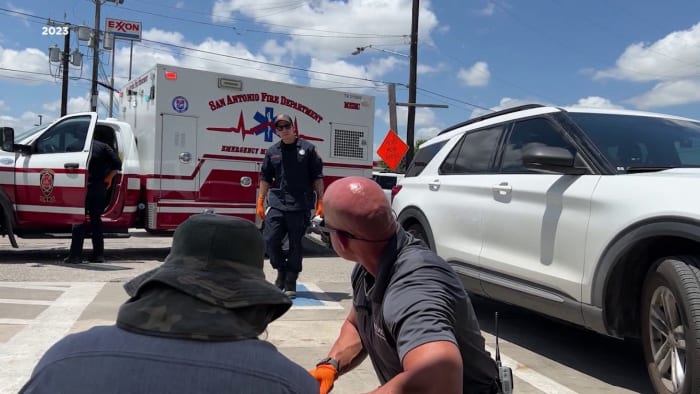SAN ANTONIO – After a heavily-lauded start, San Antonio’s mental health program is in the middle of a rapid expansion.
And it’s clear city leaders have an appetite to grow it further.
The San Antonio Community Outreach and Resiliency Effort (SA CORE) program began as a pilot program in April 2022. A three-member team comprised of a San Antonio Police officer from the Mental Health Unit, a San Antonio Fire paramedic, and a clinician from the Center for Health Care Services responded to mental health calls downtown and on the near West Side.
Their focus is more on helping someone through a mental health crisis than catching them in a crime, and they prefer to resolve problems on the scene. While they might make emergency detentions or bring someone to a clinic or behavioral hospital, very few cases end with an arrest.
SA CORE pilot program results from a May 22 Public Safety presentation (City of San Antonio)
The soft-touch approach of the polo-clad teams impressed city council members who eagerly agreed to expand the program – not only to cover the whole city, as city staff suggested but also to cover it around the clock.
“We have been reaching out to mental health providers and organizations that work in this space, and they’ve been very supportive of it,” said Councilwoman Melissa Cabello Havrda (D6), chairwoman of the Public Safety Committee.
The money for the expansion was all committed in 2023, but it’s happening in the first seven months of 2024.
The program already jumped to citywide coverage back in January with the addition of two teams. The three SA CORE teams work every day from 7 a.m. to 11 p.m., each covering a specific third of the city.
The expanded program has seen results similar to those of the pilot.
The response map for the the citywide SA CORE program from a May 22 Public Safety presentation (City of San Antonio)January – March 2024 SA CORE expanded program results from a May 22 Public Safety presentation (City of San Antonio)
The city plans to add more teams to reach 24-hour coverage beginning July 1.
“I’m actually proud that we’re moving forward this quickly and that we have the support,” said SAFD Paramedic Issac Gomez, who has been with SA CORE since it was the pilot phase.
He thinks part of the program’s success in avoiding arrests is getting people to the right facility and checking in with them later.
“We do our job that one day,” Gomez said. “The clinician will follow up within 24 hours and then again in seven days. And then they have their process of following the person up to see what was that missing link that day. Why were they in crisis or what led to that crisis, and how can they navigate themself to never get in that point again?”
The teams screen out calls involving weapons and people who are otherwise physically aggressive, and the friendly approach can lead to long run times for individual calls.
So, with more than 32,000 mental health calls coming into police through 911 in the past two years, it’s clear that even with around-the-clock coverage, SA CORE won’t be able to get to all of them.
SAPD mental health 911 calls, according to a May 22 Public Safety presentation (City of San Antonio)
“I wish we could have more SA CORE teams that could respond to all of those. It’s – right now, not a reality. Maybe one day it will be,” said SAPD Assistant Chief Karen Falks.
However, given the council’s affinity for SA CORE so far, it seems likely to be expanded even further at some point.
“I do believe that this council will continue to push for more, but this is going to be beyond this council,” Cabello Havrda said. “I mean, this is going to be years where we can get to the point where we’re handling majority of mental health issues, with SA CORE -an SA CORE team.”
Copyright 2024 by KSAT – All rights reserved.

